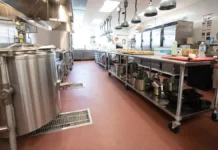
This contributor blog was originally published on Forbes.com
There have been countless analyses and opinions written about New York’s deal to bring Amazon’s second headquarters to Queens, and its dramatic collapse. Some lamented the loss of good paying jobs and tax revenue the company would have generated for New York. Others celebrated the deal’s demise with a party.
Regardless of your opinion on the Amazon deal and collapse, now is an opportunity for New York to discuss how we conduct economic development, and not only for big businesses. New York City needs a long-term, master plan to support small businesses and address our vacant storefront crisis.
If we continue to use the tax code to influence economic activity, we should recalibrate how it’s used, and also direct support to small and medium-sized businesses and the jobs they create. If there’s enough political will to kill tax incentives for large corporations like Amazon, perhaps there will be more support to extend economic benefits to local businesses like restaurants, bars, and retail shops. It’s those businesses that New Yorkers bemoan the loss of when they shutter. When we lose office jobs it’s a blow to our city, but the public doesn’t have the same emotional attachment to companies perched in office buildings as they do for the street level restaurants where they’ve created memories. And, it is these street level businesses that are under siege from bureaucratic red tape, fines, and a constant barrage of new, complicated and expensive government mandates.
So, if we want to support the storefront businesses that make our city appealing, vibrant, and unique, New York should expand existing incentive programs to restaurants and nightlife establishments.
For example, the state’s jobs program, from which Amazon would have received much of their tax incentives should be extended to jobs created in the hospitality sector. These jobs are vital to our city. They offer entry into the workforce for people from all walks of life. They provide careers, or work schedule flexibility, and create tons of opportunity for workers and job seekers. The jobs available in the hospitality industry are diverse and range from prep cook to director of human resources. As labor costs have soared in New York City, the program’s direct wage subsidy would provide a needed financial boost to restaurants, where labor and other costs have become unsustainable for too many. And, because hospitality industry jobs are available to New Yorkers who may not have the experience and skills to find work elsewhere in the marketplace, and because many of these jobs are highly susceptible to automation and elimination, there’s a compelling argument to support and preserve these jobs by using the tax code.
Elected officials often decry the vacant storefronts lining neighborhoods throughout New York City and blame landlord greed and high commercial rents. But they too often fail to cite the financial burden that skyrocketing property taxes have on these storefront businesses, which, as commercial tenants, typically bear the burden of real estate tax passthroughs in addition to their rent. A progressive city would give storefront businesses a credit for the property taxes they effectively pay. These savings would be equal to saving hundreds or thousands of dollars a month in rent for small businesses. And the money they [small business owners] get credited would be pumped right back into the economy through the additional wages they pay, their purchases from local farmers and vendors, reinvestment in their business, and if all goes well, a few extra bucks to take home for their families.
A progressive city would eliminate the unjust and inequitable commercial rent tax levied on thousands of businesses south of 96th Street in Manhattan. The tax is calculated on annual rent, not income, and has been repealed everywhere else in New York City, except in areas of Manhattan where rents and vacancies are often the highest. The State and City of New York’s Tax and Finance Departments should allow the amount of a restaurant’s FICA Tip Tax Credit to be subtracted from their taxable income, which would provide additional financial relief to restaurants.
Tax incentives could be extended to restaurants that purchase vegetables, proteins, and wine from New York State farmers and producers. This would help stimulate the local economy and reduce our environmental impact. We could pass a bill in the state legislature that would give a modest tax credit to restaurants that donate their used oyster shells to help repopulate New York Harbor’s oyster beds, which will clean our water ways, protect against storm surges, support marine life, and reduce shells that end up in our landfills.
When progressive cities enact laws like paid sick leave, and propose an unfunded two-week paid vacation mandate, like New York City recently did, they should include financial offsets and/or administrative support to lighten the impact on businesses. It’s wrong to force small businesses to fully shoulder the cost and administration of societal benefits and safety net programs. For example, benefits like social security and workers’ compensation incorporate a combination of collective contributions. This approach would help mitigate burdens and send a message to businesses that government wants to help, not just hinder.
The purpose of these tax benefits would not be to subsidize failing businesses, or be irresponsible corporate giveaways, but rather they would support the countless successful restaurants and bars that contribute so much to New York, but are challenged due to the forever increasing costs and complexity of operating in New York City.
For those people uneasy with businesses receiving tax benefits, they should know that New York City’s nightlife industry, which includes restaurants and bars, operating from 6:00pm to 6:00am, generates $697 million annually in local tax revenue, supports 299,000 jobs, and is responsible for $35.1 billion in total economic output. This doesn’t include the intangible value that the hospitality industry contributes to the City’s cultural, creative, business, and social wealth.
New York should use the tax code to support the hospitality industry, which has long supported the Empire State.

























